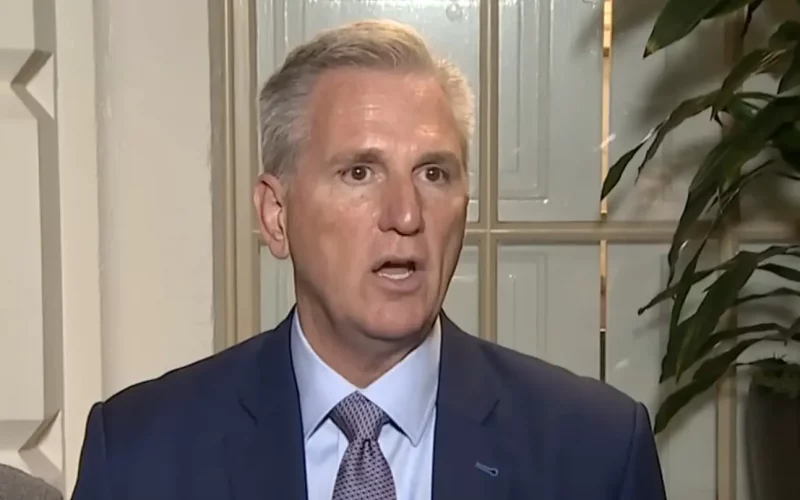Speaker Kevin McCarthy is reversing course on his plan to exclude Ukraine aid from a substantial military spending bill, as Republicans grapple with finding a path forward for government funding.
This about-face from the California Republican comes one day after he indicated to reporters that he would extract the approximately $300 million earmarked for Ukraine from the Pentagon bill and arrange a separate vote. McCarthy faced resistance from within the GOP regarding its inclusion.
However, in the Capitol on Saturday, McCarthy announced that the bill would proceed with the Ukraine aid intact, asserting that removing it would be too complicated due to the Republicans’ funding strategy, which involves presenting the Defense bill alongside other measures. This decision introduces fresh uncertainty regarding whether the Pentagon spending bill will even be considered for debate after two recent failures.
“It became too difficult to do that, so we’re leaving it in,” McCarthy explained to reporters in reference to the Ukraine funds.
Republicans are gearing up for a Tuesday vote to initiate the debate on four government funding bills: Defense, State, Homeland Security, and an agriculture bill. This marks the latest effort by McCarthy to advance his party’s funding bills. However, it remains far from certain, despite the latest developments concerning Ukraine aid, whether they have the necessary votes. Even if Republicans manage to initiate the debate or pass any of the four bills, it would not avert the scheduled shutdown set to begin on October 1.
Illustrating the prevailing uncertainty, Majority Whip Tom Emmer (R-Minn.), during a conference call with fellow Republicans, urged members to inform leadership of their intentions to vote against moving the bills to the floor, emphasizing that a formal vote check for procedural steps is not typically conducted.
“We’ll see if we get there,” remarked Rep. Erin Houchin (R-Ind.), a member of the Rules Committee, regarding the Tuesday vote to commence the debate.
The back-and-forth regarding Ukraine funding highlights the day-to-day volatility of the House GOP’s funding strategy. Their narrow majority and a series of lawmaker absences have left them with very little room for maneuvering.
An illustrative example of this is the Republicans’ hope that removing Ukraine aid would change the vote of Rep. Marjorie Taylor Greene (R-Ga.), who had previously voted against initiating the debate on the Defense bill earlier in the week.
However, a broader deal, negotiated with Rep. Matt Gaetz (R-Fla.) and other hardliners, entailed moving the bill to the floor along with funding measures for the State Department and others. This presented a new challenge with Greene because the State bill also includes Ukraine-related funds. As these bills are interconnected, it was likely that the Georgia Republican would vote against bringing them to the floor, regardless of the fate of the Pentagon funding bill.
“I think she’ll vote ‘no’ on the rule. That’s why I was trying to solve it, where everybody could be there. But this one, it didn’t work out,” McCarthy explained to reporters regarding Greene.
Instead of removing Ukraine aid from the Defense bill and conducting a separate vote, Republicans have opted for a floor vote to eliminate Ukraine-related funds from both the Defense and State bills, effectively ensuring that the funding will remain in place with the support of Democrats.
Nevertheless, Republicans are banking on the strategy of moving some of the larger funding bills in an attempt to sway holdouts, including Gaetz, who have pledged never to vote for a short-term spending patch necessary to avoid a shutdown.
Even as McCarthy’s allies spoke to reporters after the conference call on Saturday, Rep. Matt Rosendale (R-Mont.), one of the holdouts, reiterated his opposition to such a short-term bill, known as a continuing resolution.
McCarthy has proposed a month-long funding bill paired with a GOP border bill and the creation of a debt commission. During the call with his members on Saturday, he floated the idea of extending the funding patch to 45 days, allowing more time for the House to pass full-year funding bills and negotiate with the White House and Senate.
McCarthy’s suggestion comes in the wake of public opposition from enough conservatives to a 30-day stop-gap funding bill that cannot pass without Democratic support. Some GOP holdouts argue that the House should solely focus on passing the larger funding bills, even if it means a government shutdown.
Rep. Garret Graves (R-La.), a McCarthy supporter, labeled this position as a “counterproductive strategy,” noting that there was no realistic way to pass all the funding bills by the end of the month.
“We’re in a situation right now … where the arsonists are out there, number one, whining that their house is on fire. Number two, are going to want credit that they put the fire out. And then number three, they’re going to set up a GoFundMe site to get paid,” Graves said.


Sounds like Bribery is in the Congress to Me